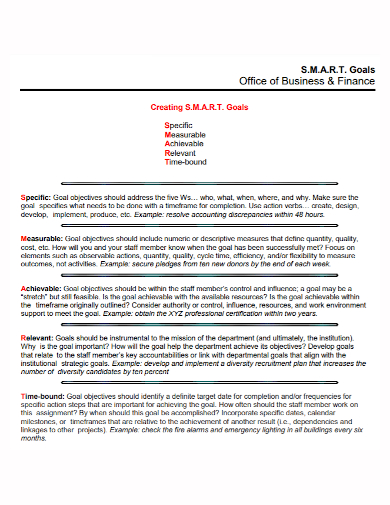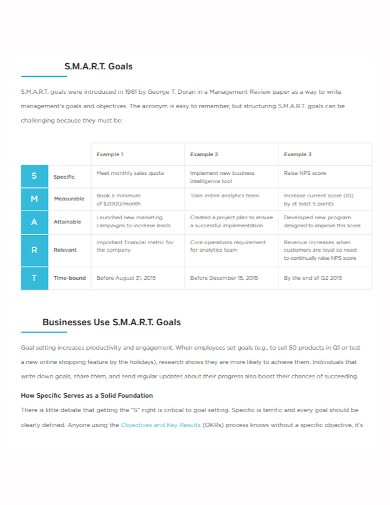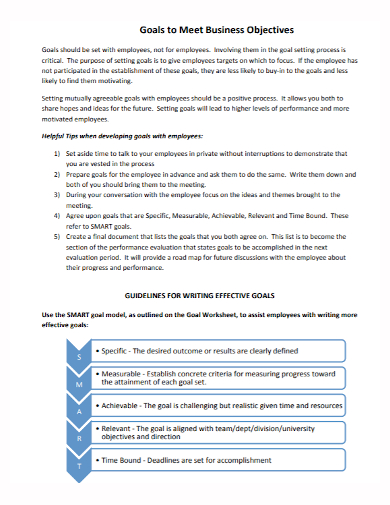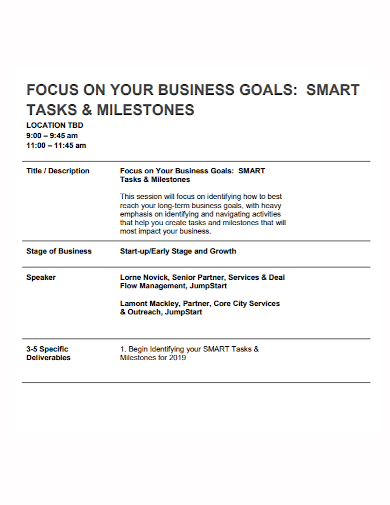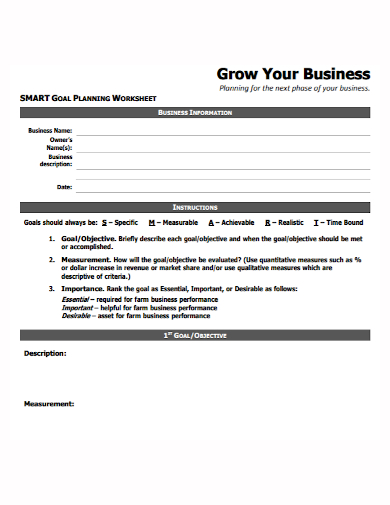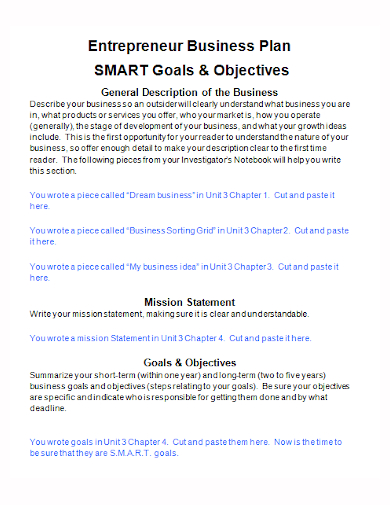Every organization exist because they have goals and aspirations they want to achieve. This may be in a form of a product or service. But simply having a goal or a vision isn’t enough to help organization strive. Goals must be attainable and realistic in nature. How do we clearly define business goals? It shouldn’t just be something out of wishfully thinking. It takes a certain method to establish this, in what we call a SMART business goals. To learn further about this, do continue reading our article and don’t forget to check out our SMART business goals samples below:
6+ SMART Business Goals Samples
1. SMART Business Finance Goals
2. SMART Business Goals
3. Effective SMART Business Goals
4. SMART Task Business Goals
5. SMART Personal Business Goals
6. SMART Business Goals Planning Worksheet
7. Entrepreneur Business Plan SMART Goals
What Is a SMART Business Goals?
SMART is an acronym for specific, measurable, attainable, relevant and time-bound. This is what goal setting should be based on for any business organization. If you develop your company’s goals and objectives to meet these requirements, then your business plan or marketing plan will have a good chance for success. SMART goals are relevantly good reference when your management goes into planning as it makes it more easier for you to define what you intend to achieve.
How to Write Smart Business Goals?
SMART business goals makes the management system effective in helping you set effective objectives. It is strategically designed to give any business project structure and traceability to your actions and provides clear milestones to let you know you’re on the right track. With SMART goals, you get to track your progress and stay motivated. So how do you use SMART business goals to help you create actual goals and objectives for your company? Here is a run down to help you understand this methodology.
I. Be Specific
A goal that is describe in a more specific term has a greater chance of being accomplished rather than generalizing it. You can use the following as reference when formulating the specifics of a goal:
- Who needs to be involved.
- What needs to be accomplished.
- Where — is there a specific location for this goal you are formulating?
- When — create a time frame.
- Which — describe the requirement and identify the constraints and implications.
- Why — specify the reasons, purpose or benefits of this goal attainment.
II. Make it Measurable
Establishing a concrete criteria for measuring the progress towards the attainment of each goal will help measure the progress and stay on track to meet your target dates. This is a great way to stay motivated, and good examples of this are digital platform or a white board posted in your office can help as a daily reminder to keep yourself and your employee focused on the targeted results you want to attain.
III. Set Attainable Goals
Businesses are at times are too overwhelm with the goals they set and the ideas that come pouring in. This is why it is important to, as mentioned be specific, but also these goals should be attainable no matter how fancy or ambitious these may be. Management must stick to what they can do to achieve this and manage whatever resources that they are capable of. Sure, there is nothing wrong about taking on risk, but do it moderately.
IV. Relevant
Achievable business goals are based on the current conditions and realities of the business climate. A company’s goals should always be also pertinent to something that will define the company’s mission, objectives and line of business. Develop goals that will relate with departmental goals that align with the organization’s strategic business plans.
V. Time-bound
You won’t be able to accomplish your goals without a set time frame tied to the process. Break down each goal into a specific set of tasks and activities to accomplish your goals. With time constraints in place, everyone will have a sense of urgency and motivation to work on it.
FAQs
What are Organizational Goals?
Organizational goals are created in an attempt to achieve a desired state of profit and success. General organizational goals are found in the mission vision statement of the company, but details of those goals are defined in the business plan.
What Is the Importance of Business Goals?
Business goals are powerful driving force that propel companies to achieve desirable outcomes which is in a form of profit and revenue.
What Is a Business Plan?
Business plans are documents that contain a company’s description and overview such as their products or services, the market it serves and the business’ competitive advantage.
With the help of SMART business goals, your company would never go astray or disorganized with their business endeavors. As it is always good to have a steady reference or guide to help you along the way. Making it more easier for the company to manage its expectation and make any improvements should anything go wrong with their goal setting plans.
Related Posts
FREE 10+ Short Term Action Plan Samples
FREE 10+ Audit Action Plan Samples
FREE 10+ Human Resource Statement of Purpose Samples
FREE 10+ Goal Attainment Samples
FREE 9+ Operational Plan for Cleaning Services
FREE 9+ Goal Tracking Samples
FREE 8+ Marketing Objective Example Samples
FREE 6+ Market Research Business Plan Samples
FREE 4+ Business Development Marketing Plan Samples
FREE 23+ Microsoft Business Plan Samples
FREE 10+ Implementation Action Plan Samples
FREE 10+ Retail Action Plan Samples
FREE 10+ Mentoring Action Plan Samples
FREE 8+ Sample Job Objective Statement
FREE 3+ Retail Budget Samples

